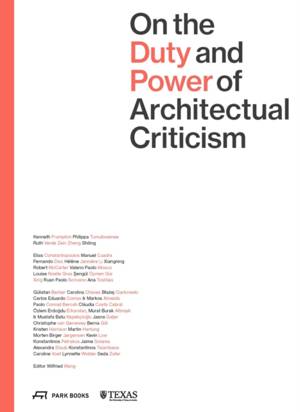
- Afhalen na 1 uur in een winkel met voorraad
- Gratis thuislevering in België vanaf € 30
- Ruim aanbod met 7 miljoen producten
- Afhalen na 1 uur in een winkel met voorraad
- Gratis thuislevering in België vanaf € 30
- Ruim aanbod met 7 miljoen producten
Zoeken
On the Duty and Power of Architectural Criticism
Proceeds of the International Conference on Architectural Criticism 2021
Wilfried Wang
Paperback | Engels
€ 37,45
+ 74 punten
Omschrijving
A rich collection of essays that offer essential, independent voices on architecture criticism in a highly challenging media environment. Should architectural criticism be enlightening? Should it help in the creation of a better built environment? Is there a factual basis to it? Does it have a duty to present evidence in the evaluation of a building? Or should it take on what architects say about their designs? In the context of a flat internet, should architectural criticism be able to define best practices? Does it wield the power over who is in and who is out? Architectural criticism is at a crucial juncture. While serious architecture struggles for recognition, much so-called architectural criticism is merely a poorly paid, decorative legitimation for hyperbolic practice. Incisive architectural criticism is rare, while the definition of criticism itself has become opaque. The 2021 International Conference on Architecture Criticism has gathered exceptional papers that define the purposes and methods of architectural criticism: What should be the ethical basis of architectural criticism? Can it be objective in the context of paid content? Should it outline ideal practices? Or what else should it do? All contributions in this book address either the duty or the power of architectural criticism. In both cases, the authors offer the outline of one analysis of an existing building. Incisive and thought-provoking, On the Duty and Power of Architectural Criticism provides concrete case studies for future generations of architectural critics.
Specificaties
Betrokkenen
- Auteur(s):
- Uitgeverij:
Inhoud
- Aantal bladzijden:
- 320
- Taal:
- Engels
Eigenschappen
- Productcode (EAN):
- 9783038602712
- Verschijningsdatum:
- 19/02/2023
- Uitvoering:
- Paperback
- Formaat:
- Trade paperback (VS)
- Afmetingen:
- 192 mm x 258 mm
- Gewicht:
- 1360 g

Alleen bij Standaard Boekhandel
+ 74 punten op je klantenkaart van Standaard Boekhandel
Beoordelingen
We publiceren alleen reviews die voldoen aan de voorwaarden voor reviews. Bekijk onze voorwaarden voor reviews.











